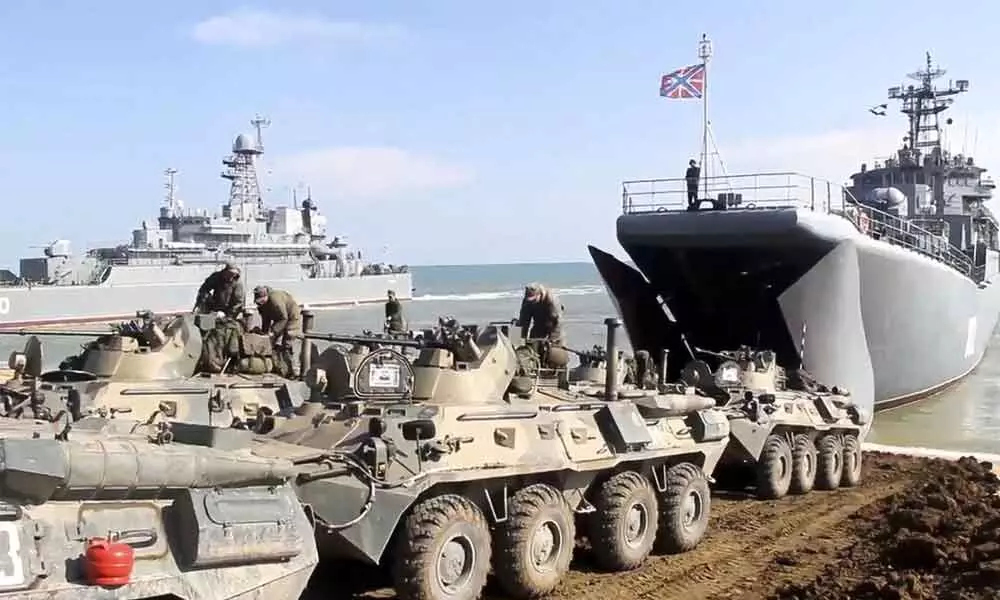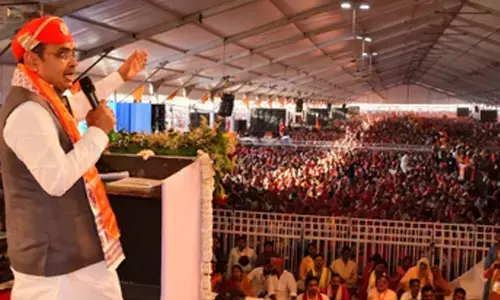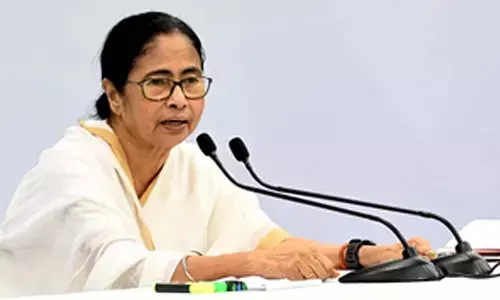Ukraine testbed for big power contestation

Ukrainian President Volodymyr Zelensky declared February 16, 2022 as 'Day of Unity' apprehending Russian invasion based on US assessment, after speaking to his American counterpart Joe Biden about Russia’s military build-up along Ukraine’s borders, with both committing to pursue "diplomacy and deterrence."
Ukrainian President Volodymyr Zelensky declared February 16, 2022 as 'Day of Unity' apprehending Russian invasion based on US assessment, after speaking to his American counterpart Joe Biden about Russia's military build-up along Ukraine's borders, with both committing to pursue "diplomacy and deterrence."
It comes after inconclusive talks between Russian President Vladimir Putin and Biden. USA continues to hype the threat, following it with evacuation of troops and citizens, whereas Russia maintains that it has no intention to invade Ukraine, but draws a redline for Ukraine not to join NATO.
While the flashpoint may be Ukraine but contestation is of big powers involved directly or indirectly. The outcome of this face-off has global implications not only in Europe, but globally including countries who are outside the region.
Main Stakeholders' Stance
Russia: Post USSR disintegration in 1991, NATO adopted open door policy allowing erstwhile USSR countries to join NATO, if agreed by all existing members. When such eastward expansion, after adding 14 countries, reached at consideration of Georgia and Ukraine, Putin drew a redline, failing which Russia would have to face a direct land border with NATO at strategically sensitive area. Russia thus reacted with annexation of Georgia, Crimea and posturing Ukraine, after it renewed its effort to join NATO, and is firm that it will not allow Ukraine's entry into NATO at any cost.
Ukraine: Ukraine has a reason to feel betrayed because in 1994, 'The Memorandum of Security Assurance' was signed at Budapest, in which Russia, US and UK assured that its sovereignty will not be compromised, which was a major factor in Ukraine giving up its nuclear arsenal (Third largest nuclear arsenal in the world at that time) and signed NPT.
Now, Russia appears to be threatening its sovereignty, and the United States and the United Kingdom are unwilling to send boots on the ground to protect it. Ukraine is not yet a member of NATO, so NATO and the US are not obligated to defend it. Strategically and geographically, Ukraine finds itself as testbed to gauge Russian resolve against NATO having lost Crimea already, with threat of proxy war from Eastern region, even if it shelves/postpones decision of joining NATO. Ukraine continues with its demand to join NATO as its sovereign decision.
US: Struggling with loss of face post annexation of Georgia, Crimea and recently botched withdrawal from Afghanistan, losing footprints in most of West Asia, US wants to checkmate Russian aggressive stance by taking up sovereignty issue of Ukraine in terms of freedom to join NATO or otherwise. It, however, has no appetite to put boots on ground in Ukraine, but is worried that a westward expansion of Russia can make some of the existing NATO allies vulnerable. If it blinks here, it loses psychological edge against China too.
European Union (EU): EU members who are NATO allies are trying to put up a joint brave front, but the cracks are visible. EU's 40 per cent dependency on Russia is crucial to preserve its energy interest. It may be easy for Biden to say that Russian offensive will be end of Nord Stream 2, but it may not be easy for Germany to second it. The best option for them is diplomacy.
Other Global Players
China: It's happiest situation for China, as the face-off has diverted attention of US from China to Europe, to some extent. It can derive pleasure out of awkward position of US, cementing ties with Moscow as never before, at the same time test the appetite of Biden, in case it decides to invade Taiwan. It bears no obligation and can watch from sidelines playing neutral with no cost to bear.
India: India has good relations with all affected parties and can remain neutral. Indian concerns will include its diaspora, trade (edible oils, pharmaceutical exports etc) with Ukraine and impact of sanctions on Russia, if announced by Washington.
NATO allies and partners in Indo-Pacific like Taiwan, Japan, Australia and South Korea are also watching NATO responses keenly as the situation could replicate itself, should President Xi Jinping decide to reunify China or assert further in South/East China Sea or Indo-Pacific.
Possible Scenarios
Full-Scale Invasion: Strategically the cost benefit analysis doesn't suggest a full-scale invasion of Ukraine by Russia, because NATO, which was already reluctant in admitting Ukraine into NATO has been shaken up adequately not to do so. Having achieved its major aim, annexation will be cost prohibitive in terms of casualties and economic sanctions, forcing NATO to respond directly or indirectly to avoid loss of face, without achieving anything substantial.
Limited Objective: Russia integrates Donetsk People Republic and Luhansk People Republic, who already treat themselves as republics, to teach Ukraine a lesson and tests NATO reaction. The cost paid by Russia will be lower than full-scale invasion, but sanctions, economic cost will be almost the same. It will strengthen Ukraine's case for induction in NATO.
Standoff continues: It may be too costly for Russia and Ukraine in terms of finances. Unlikely beyond a point.
Diplomacy Prevails: Both sides provide a face-saver to each other to de-escalate. Best option in global interest.
In all scenarios, China benefits immensely from the situation and US doesn't seem to gain much, except some additional arms scale in case of full or limited invasion.
(Writer is a strategic and security analyst. He is the Chief Instructor, United Service Institution of India)









